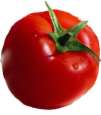You Say Tomato
 It really does appear to be the case that things are not what they seem. A scientist friend of mine was explaining to me that a red tomato, for example, is not actually red. We see it as red because red light waves can’t be absorbed by the tomato, like the other colour waves in the light spectrum. These red light waves are bounced back at us, so colour-wise we see what the tomato isn't, rather than what it is. The colour tells us more about what's happening on the surface than it does about the deeper nature of the fruit. His comment left me in deep thought for the rest of the day.
It really does appear to be the case that things are not what they seem. A scientist friend of mine was explaining to me that a red tomato, for example, is not actually red. We see it as red because red light waves can’t be absorbed by the tomato, like the other colour waves in the light spectrum. These red light waves are bounced back at us, so colour-wise we see what the tomato isn't, rather than what it is. The colour tells us more about what's happening on the surface than it does about the deeper nature of the fruit. His comment left me in deep thought for the rest of the day.If it's difficult to fully understand the nature of what's in front of our very eyes, how much harder is it to know what we mean when we talk about that elusive term 'God?'
Throughout the centuries men and women of every faith, and none at all, have projected on to God a variety of images - some light, some dark. Wise people recognise that what 'obviously' seems to be the identity of God, may in fact be more an indication of what God is not, rather than what God is. This suggests that we should be cautious in our claims about God.
I can't help wondering if, contrary to popular belief, Holy Scripture doesn't give us the identity of God, but constantly reminds that God is more than we can ever imagine.
You think God is Almighty; here we are waiting for Him to come into the world as a baby. You think God is King of all creation; here He is crucified and dying on a cross. You think God loves the righteous; here He is eating and living among sinners. The message seems to be that the minute we think we've got God pinned down, all we've done is crucify the very nature of what we're trying to express.
Labels: Advent Prayers, Anglican Advent Prayers, Anglican Prayers, Anglicans, Prayers Anglican, tomato fruit or vegetable





